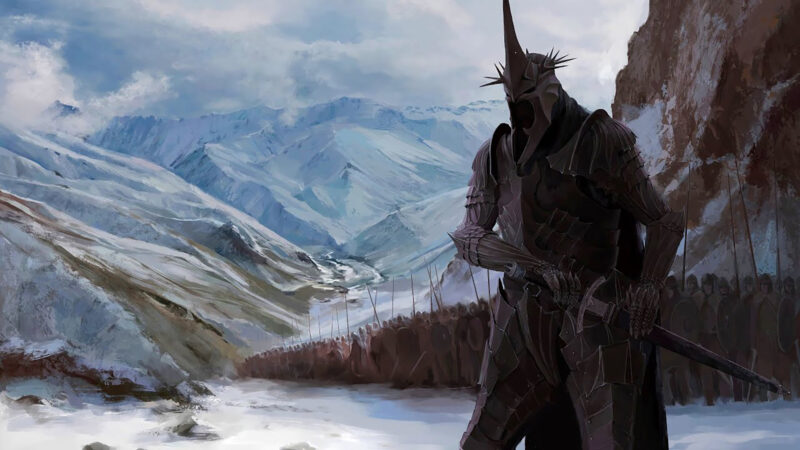RAIDS, CIVIL WARS, AND WEAKENING OF THE REALMS
Though Arnor survived the invasion, it emerged as a mere shadow of its former self. With Rhudaur gone and Cardolan on the brink of collapse, the realms of Arnor struggled to recover from the Angmar War. Meanwhile, Gondor faced its own hardship, descending from the heights of its golden age. Valacar, a son and heir to King Romendacil the Second, lived among the Northmen of Rhovanion for years. He married the chieftain’s daughter, Vidumavi, and they had a son named Eldacar.
Attempting to maintain amicable relations with the Kingdom of Rhovanion, Romendacil approved of their union. However, trouble ensued when Valacar returned to Gondor with a foreign bride, sparking outrage over the perceived dilution of the blood of Dunedain Kings with that of common men. Castamir the Usurper, a captain of ships and cousin to the ruler, garnered support for his faction, particularly in Umbar and Southern Gondor. Small-scale rebellions erupted during Valacar’s reign, and his death in 1432 led to a full-blown civil war when his half-blood son, Eldacar, inherited the throne.
Participating in the kin strife, Eldacar proved himself a valiant warrior, matching his full-blooded father’s prowess. By 1437, overwhelmed by enemies, he suffered the loss of his son and witnessed the burning of the capital, Osgiliath. Evading capture, Eldacar sought refuge among his mother’s people in Rhovanion. Over the next decade, he amassed an army of Northmen and loyalists from northern Gondor. Meanwhile, Castamir ruled as a cruel tyrant, earning the people’s loathing. When Eldacar returned, he found widespread support, leading to his triumphant reclaiming of the throne.

In the brutal Battle of the Crossings of Erui, Gondor’s finest warriors paid a heavy toll, with many losing their lives. However, Eldacar ultimately emerged victorious, engaging in single combat with his rival Castamir and slaying him. The defeated sons of the Usurper retreated southward with their navy, finding refuge in Umbar, where they garnered support from the Black Numenoreans and Haradrim. Establishing themselves as the corsairs of Umbar, their descendants harbored an enduring hatred for Gondor, consistently raiding its settlements. While Eldacar triumphed in the Civil War, ruling until his death in 1490 and passing the throne to his son Aldamir, the victory came at a significant cost, prompting the encouragement of migration from Rhovanion to replenish the dwindling Dunedain population.
However, this migration led to the dilution of bloodlines and the gradual erosion of the divine blessings bestowed upon the Numenorean descendants. Struggling to maintain control over the farthest reaches of the realm, Aldamir led his armies south in 1540 but met his demise in battle against the rebellious kings of Harad and their Umbar allies. Succeeding to the throne, Vinyarion sought vengeance for his father and achieved a significant victory, earning the title Hyarmendacil.
Upon Vinyarion’s death in 1621, the throne passed to his son, Minardil, who, in 1643 decided to visit Southern Gondor. During his journey, Angamaite and Sangahyendo, the grandsons of Castamir, launched a devastating raid from Umbar, assassinating the King and pillaging Pelargir. Despite his short reign, King Minardil witnessed the rise of the House of Hurin when Hurin of Emyn Arnen was appointed Steward of Gondor. A faithful servant, Hurin’s dedication earned such renown that the title of Steward became hereditary in his house. In response to Minardil’s tragic death, his son and successor, Telemnar, initiated the construction of a fleet to attack Umbar. However, these plans were thwarted when a devastating plague, likely orchestrated by Sauron, swept through the East, spreading westward across Rhovanion, Gondor, Eriador, and beyond.
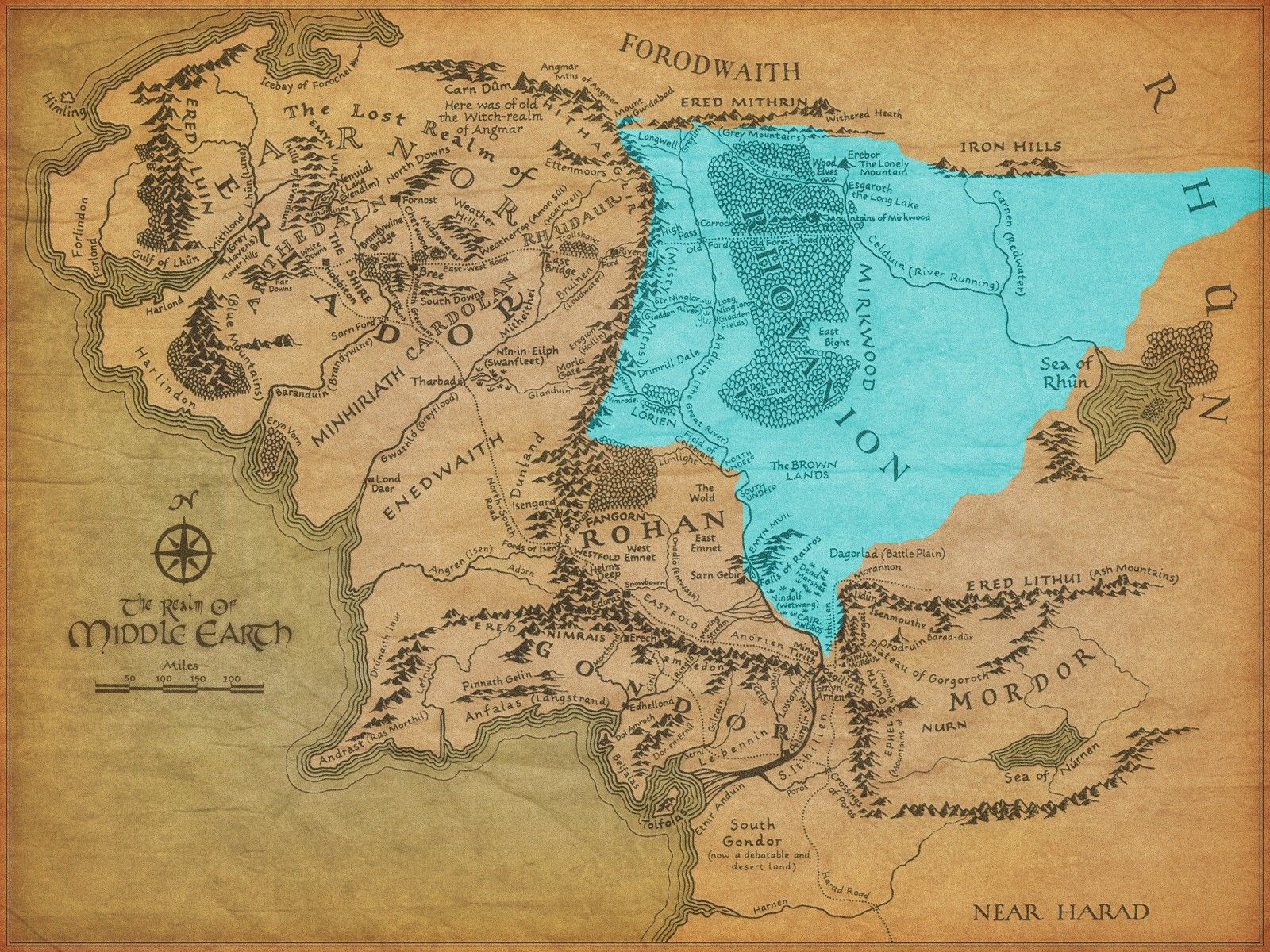
Rhovanion suffered the most, losing nearly half its population, while Gondor, weakened by the loss of its King, his children, and the White Tree, faced significant hardships. Abandoning the towers guarding Mordor, Gondor relocated its capital from Osgiliath to Minas Anor. As the plague advanced north towards Arnor, Cardolan lost its last inhabitants, and Angmar further prevented resettlement by sending Undead barrowwights to haunt the land. One of the few realms that were spared the devastating plague was the Dunlandings, the Hillmen, as their isolated existence limited contact with outsiders.
Following the reign of Telemnar and his heirs, the throne of Gondor passed to the King’s nephew, Tarondor, who sought to revive the realm by planting a second white tree in the new capital of Minas Anor. Dedicated to the recovery of Gondor, Tarondor was succeeded by his son Telumethar, who believed the time was ripe for vengeance against Umbar for the death of his great-grandfather and the Corsairs’ continuous raids on the southern realms.
In 1810, Gondor achieved a significant victory, capturing Umbar, expelling the Corsairs, and eliminating the last descendants of Castamir. In honor of this triumph, Telumethar added Umbardacil to his name, signifying victory over Umbar. Following Telumethar’s death in 1850 and the ascension of his son Narmacil the Second, Gondor once again found itself at war, this time facing the formidable Wainriders, a powerful Easterling tribe whose chieftains rode chariots into battle.
REIGN OF WAINRIDERS
Emissaries of Sauron encouraged the Wainriders to invade eastern Gondor in 1851. Responding to this threat, Narmacil the Second assembled a formidable army, reinforced by allies in Rhovanion, to confront the Wainriders in the Battle of the Plains. However, Gondor was unprepared for the Wainriders’ might, resulting in their King’s loss and a devastating defeat. Not only did Gondor cede their eastern territories, but their attention was diverted from the defense of Umbar, allowing the Haradrim to recapture the city.
The defeat also left Gondor unable to protect their Rhovanion allies, who were subsequently enslaved by the triumphant Wainriders. Outraged by the death of the King, Calimethar, his son and successor, began assembling another army. However, before he could engage the enemy, a message arrived from Marhwini, a Northman descendant of the kings of Rhovanion, who now ruled the Eotheod. Marhwini warned of Wainrider raids in Calendardhon and offered assistance, prompting Calimehtar to march his forces to Dagorlad.
With the aid of Marhwini and his Northmen rebels, Gondor halted the advance of the Easterlings, winning a few decades of relative peace. Meanwhile, in Arnor, King Araval, witnessing the resurgence of Angmar, gathered an army supported by elves from Lindon and Rivendell to defeat the enemy in 1851. Although both Gondor and Arnor celebrated crucial victories, their joy was short-lived as attacks persisted, prompting some to question the orchestrated downfall of their kingdoms.
Over 2000 years since the destruction of Numenor, the surviving Dunedain faced severe weakening and encirclement by enemies. Seeking respite between wars, King Ondoher of Gondor arranged a strategic marriage, uniting his daughter Firiel with Prince Arvedui, the son of the King of Arthedain in Arnor. Despite their hopes, the alliance proved ineffective as the Dark Lord Sauron, orchestrating in the shadows, sought to undermine their efforts and destroy both kingdoms.
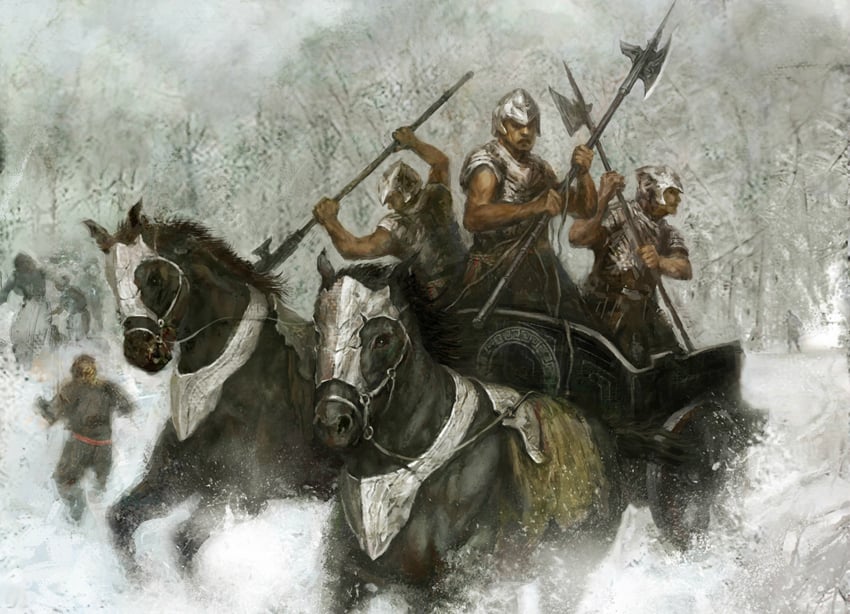
Still weakened from his defeat at the end of the Second Age, Sauron slowly regained his strength in Dol Guldur. His servants carried out his will, with some venturing east to encourage the Wainriders, who had failed in their recent attempt to invade Gondor. The Wainriders, eager for revenge, journeyed south of Mordor to forge alliances with the men of Khand and near Harad, other enemies of Gondor nursing their own grievances. In 1944 TA, the coordinated efforts of the Easterlings and the Southron Alliance led to a simultaneous attack on the Kingdom of Gondor from both the North and the South.
Forewarned by the Lord of Eotheod, a Gondorian ally, King Ondoher received notice of the impending invasions. Preparing for a two-front war, he divided his forces, sending General Earnil, a relative of the King, with a smaller army to the South, while Ondoher and his eldest son, Artamir, led the more prominent host to the North.
Concerned about the succession, Ondoher instructed his youngest son, Faramir, to stay behind as Regent. However, Faramir, unwilling to remain while his family went to war, disobeyed his father’s orders and joined the army in disguise. Tragically, he met his demise during an attack on the Dead Marshes.
The Battle of Morannon unfolded with the Wainriders launching a ferocious assault, catching the Gondorian forces off guard. Riding chariots and horses with unmatched speed, the Wainriders descended upon the King’s army, savagely cutting down their center ranks. The unexpected attack resulted in the deaths of both King Ondoher and his son Artamir. Minohtar, Ondoher’s nephew and commander of the right-wing, took charge of the remaining forces.
The news worsened when the Lord of Eotheod informed General Earnil that Prince Faramir was supposed to be safe, but he had perished in the fighting. Overwhelmed by the relentless assault of the Wainriders, General Minohtar fell in battle, leaving the last remnants of the Gondorian forces under the command of Prince Ardrahil. Despite their eventual defeat, the Wainriders declared victory, initiating a raucous celebration.
Facing grim odds in the South as the men of Khand and near Harad captured Umbar, Earnil and his forces persevered and halted the enemy’s advance in Ithilien. Learning of the disaster at Morannon, Earnil wasted no time and marched north to face the Wainriders. To his surprise, he found them drunk and distracted, providing an opportune moment to strike. In the Battle of the Camp, Earnil charged against the inebriated Wainriders, securing a decisive victory and ending the immediate threat.
FALL OF THE ARNOR
Despite their alliance, Arthedain could not provide aid during the invasion of Gondor, as the last realm of Arnor was preoccupied with fending off the forces of Angmar in the North. Once a mighty kingdom, Arnor had been reduced to a mere shadow of its former self due to centuries of division and conflict, relying on support from the elves of Lindon and Rivendell to maintain its defenses.
Araphant, the Monarch of Arnor, not only ruled over his realm but, as a direct descendant of Isildur, held the title of High King of the Dunedain, exerting influence over all his people. When the question of succession arose in Gondor after the death of the King and his sons, Araphant’s heir, Arvedui, who was married to Firile, the last surviving child of Ondoher, offered himself as a candidate to rule and eventually unify the kingdoms.
However, the people of Gondor rejected this offer, recognizing the weakened state of Arnor and no longer considering it an equal power. Instead, they chose the war hero Earnil as their new King. Demonstrating wisdom and humility, Earnil sent a letter to Arvedui upon his ascension, expressing gratitude for Arnor’s friendship and promising aid when possible.

As the soldiers of Arnor grappled with holding back the Witch King of Angmar, events reached a critical juncture in 1974 when the enemy army overran Arthedain’s defenses and captured the capital of Fornost. Gathering whatever heirlooms he could, King Arvedui, who inherited the throne after his father’s death, led his people to establish a defensive position in the North. However, the armies of Angmar once again closed in, prompting the monarch to lead his people to seek refuge in the Blue Mountains.
Separated from his father during the fall of Fornost, Aranarth, Arvedui’s son, went west to seek assistance from the elf Lord Cirdan of Lindon. Cirdan immediately dispatched a ship in search of his ally. Running out of supplies, Arvedui had no choice but to leave the Blue Mountains and seek the Lossoth, also known as the Snowmen of Forochel. This ancient tribe of humans, descended from the Forodwaith of the First Age, had adapted to living in the cold. In response to the threat of Angmar in the Third Age, the Lossoth migrated to the Cape of Forochel, where the enemy could not follow.
Desperate for food and shelter, King Arvedui approached the primitive people and offered jewels of great value for their aid. However, the Lossoth had no interest in such material wealth and instead assisted them out of pity and a measure of fear for their weapons. When the elves of Lindon finally arrived on a grand ship to rescue the King, the Lossoth was astounded, having no knowledge of sailing technology. Despite their warnings, Arvedui was determined to return south and continue the struggle against the Witch King.
To express gratitude to the Lossoth for their assistance, the King gifted them the Ring of Barahir. Unfortunately, the Lossoth’s prediction proved correct, and the elves encountered a terrible ice storm on the return journey. The ship was destroyed, resulting in the death of the King and the loss of significant Numenorean heirlooms, including two of the Palantiri. Upon learning of his father’s loss, Aranarth inherited the rule of Arnor but realized that his Kingdom no longer existed.
Opting not to take the title of King, Aranarth, as a descendant of Isildur through his father and Anarion through his mother, declared himself chieftain of the Dunedain. He gathered whatever soldiers of Arnor remained to create the Rangers of the North, an elite group dedicated to waging a long-term war against the dark armies throughout their former lands and beyond.
The children and families of these Rangers, along with the heirlooms they still possessed, sought refuge in Rivendell under the protection of Lord Elrond, who shared kinship with the Royal House of the Dunedain. Upon hearing about Angmar’s invasion, King Earnil of Gondor began gathering a host under the command of his son Earnur to march North and assist their allies.
Arriving too late, they found Arnor destroyed and its King dead. Forming a coalition army with the elves of Lindon and Rangers of Aranarth, Gondor even included a company of Hobbit archers from the Shire. They marched upon Angmar, seeking vengeance for the loss of Arnor and hoping to finally end the Northern threat.
At the Battle of Fornost, the Witch King, confident in victory, initiated the attack but was overwhelmed by the coalition forces and forced into retreat. Falling back to Angmar, the Witch King faced further troubles when an army from Rivendell arrived, led by the powerful Glorfindel, to aid the alliance. With his forces destroyed and his realms besieged by enemies, the Witch King stepped forth to personally do battle with Earnur of Gondor.
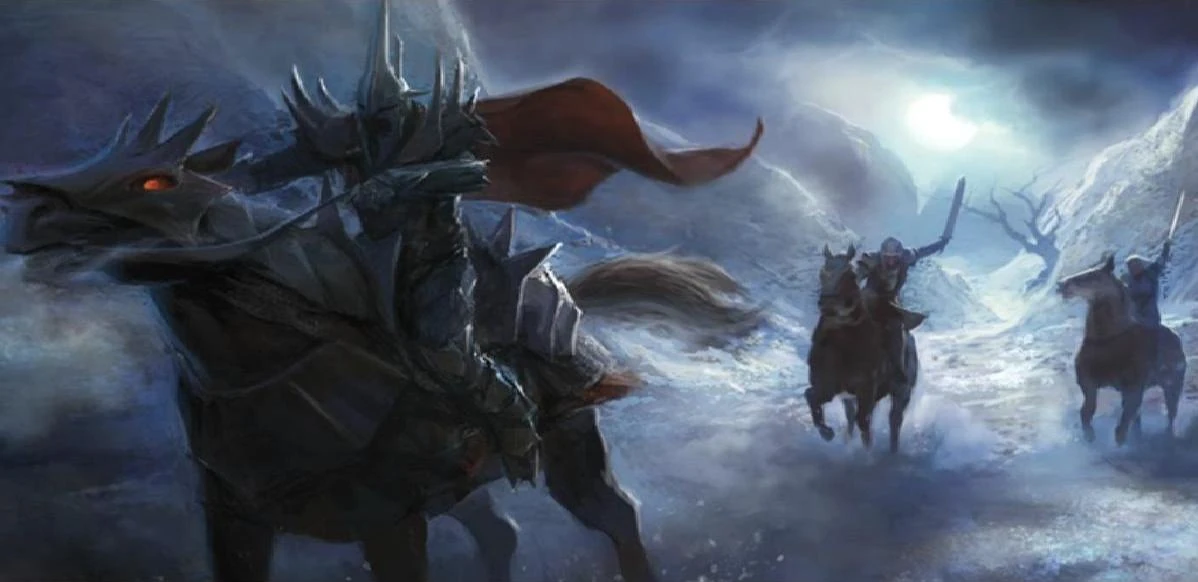
His look and presence were so terrifying that Earnur’s horse, frightened, fled with the prince on his back. Laughing and mocking the flight of his adversary, the Witch King was soon silenced by Glorfindel, who charged and attacked with such fury that the ruler of Angmar also fled the battle, disappearing into the shadows. Though Earnur wished to pursue, Glorfindel claimed it was useless as his death lay elsewhere, saying:
“You will not return to this land, far off yet is his doom, and not by the hand of man shall he fall.”
Despite being defeated and unable to permanently establish the realm of Angmar, the Witch King succeeded in his primary mission of destroying Arnor, leaving a weakened Gondor as the last Kingdom of Dunedain. Ready to focus his attention south, the Witch King journeyed to Mordor, where he reunited with the other Nazgul and formed a new army. They used this army to besiege Minas Ithil in 2000 TA, capturing the city and its great treasures, including another of the Palantiri.
RENAMINGS AND RELOCATIONS
Changing the city’s name to Minas Morgul, it became the home of the Witch King, while Gondor, as the capital of Minas Anor, was renamed Minas Tirith, meaning Tower of the Guard. After the death of Earnil in 2043, his son Earnur inherited the throne. Known as a warrior of great renown, he felt deeply embarrassed about his horse, which had made him flee from combat against the Witch King.
Taking advantage of the warrior’s pride, the Nazgul leader sent a message following his capture of Minas Morgul, challenging Earnur to single combat. Realizing this was a terrible idea, the Steward of Gondor convinced the King to refuse. But when the Witch King reissued the challenge seven years later, Earnur could not be restrained. Riding with a small party of companions into Minas Morgul, he was never seen again.
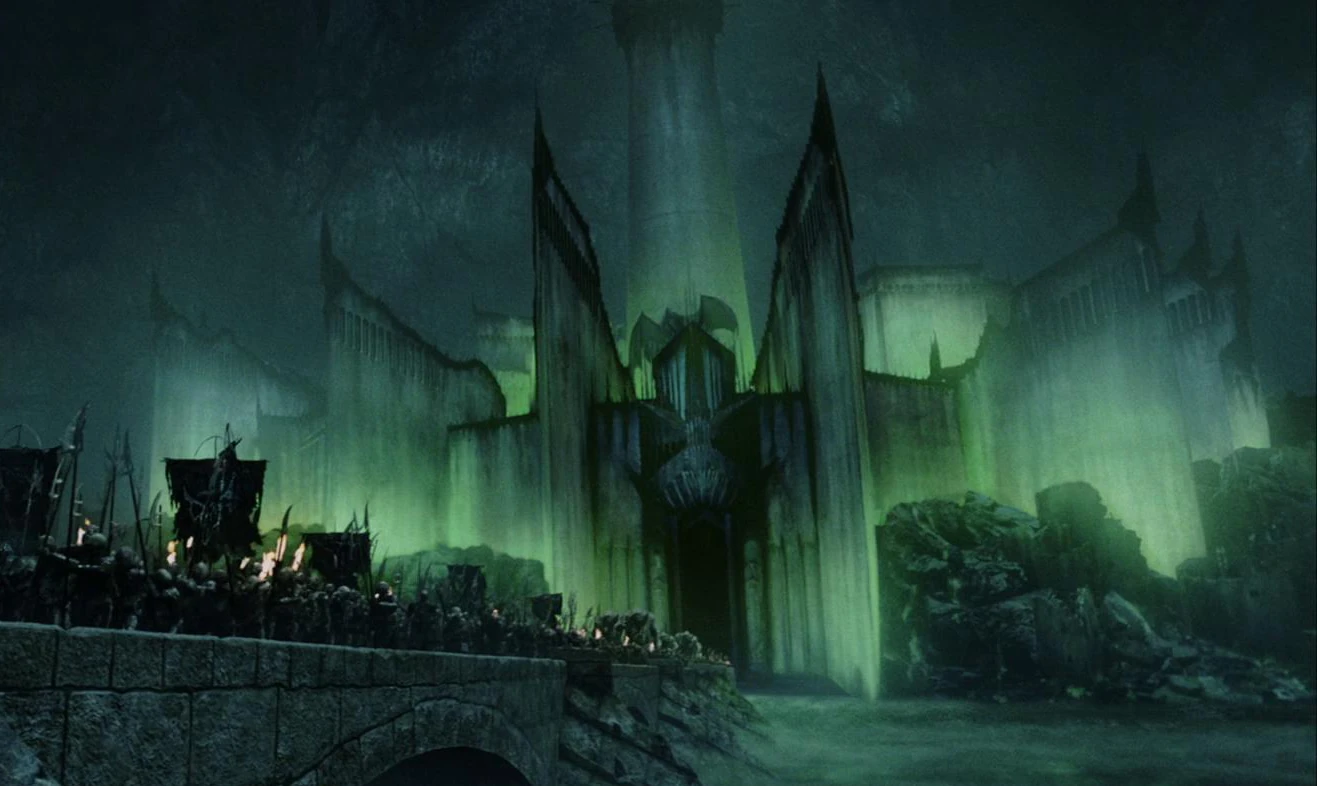
Before his departure, he visited the Hallows where nobility were buried and left the crown of Gondor upon the lap of a statue of his father, where it remained for a thousand years as no new king was chosen with power. Instead, it was given to Mardil Voronwe of the House of Hurin, who was named the ruling Steward. This meant he and his descendants were to lead Gondor until the return of the King.
Following the devastating conclusion of the centuries-long Angmar war, the Dunedain realm of Arnor was gone, while Gondor, still united but greatly diminished in power, became the new target of the Witch King, who began another centuries-long campaign in the South. Yet for some, at least, the defeat of Angmar, the continued protection of the Rangers, and the withdrawal of the Nazgul leader meant a respite from the years of terror that had gripped this region of the continent.
Two years after the Witch King’s retreat south, the Eotheod, living between the Misty Mountains and Mirkwood, at last, felt they could safely move their people, establishing Framsberg in the Gray Mountains. In 1979, the Hobbits of the Shire, formerly subjects of Arnor, elected Bucca of the Marsh to rule their lands as an independent realm. Bucca brought them years of peace and prosperity, with the Shire becoming such an idyllic place for their people that they became profoundly isolationist and largely neutral to all outside conflicts. Those who descended from Bucca of the Marsh were of the Oldbuck clan, which later became the Brandybuck, producing such heroes like Meriadoc Brandybuck, one of the nine companions in the Fellowship of the Ring.
Sources and Further Information
- Tolkien, J.R.R & Tolkien, Christopher. “The Silmarillion,” Houghton Mifflin Company (2004)
- Tolkien, J.R.R & İpek, Çiğdem Erkal “Translator”. “Yüzüklerin Efendisi,” Metis Yayınları (2007)
- Tolkien, J.R.R & Tolkien, Christopher. “The Children of Húrin,” HarperCollins (2007)
- Tolkien, J.R.R & Tolkien, Christopher. “Beren and Lúthien,” Houghton Mifflin Harcourt (2017)
- Tolkien, J.R.R & Tolkien, Christopher. “The Fall of Gondolin,” Houghton Mifflin Harcourt (2018)
- Orta Dünya – Legendarium Türkiye, YouTube
- Yüzüklerin Efendisi – Orta Dünya, YouTube
- Nerd of the Rings, YouTube
